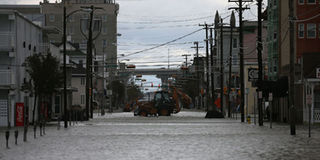Sandy muffles US campaign a week from election day

PHOTO | MARK WILSON A loader drives past a flooded street, on October 30, 2012 in Ocean City, New Jersey.
What you need to know:
- Obama stayed in the White House, acting as a leader in the eye of crisis, wielding control of an emergency federal government operation through the night as murderous winds and floods swamped New York and New Jersey
- Republican nominee Romney, left with few options with his antagonist off the trail, also put campaigning on hold, but tried to show compassion with a rally converted into a "storm relief" event in swing state Ohio
- The storm, allowing Obama to project presidential authority, could help his approval ratings, but with both campaigns believing that there are few undecided voters left, it was unclear whether it would actually shift votes
WASHINGTON
Superstorm Sandy muffled vitriolic campaigning a week from the US election, as President Barack Obama managed the aftermath Tuesday and Mitt Romney faced a post-disaster political minefield.
Obama stayed in the White House, acting as a leader in the eye of crisis, wielding control of an emergency federal government operation through the night as murderous winds and floods swamped New York and New Jersey.
"I want everyone leaning forward on this," Obama told a meeting of top-level disaster officials in the White House Situation Room on Tuesday, demanding creative thinking to help clear up the mess, a US official told AFP.
"I don't want to hear that we didn't do something because bureaucracy got in the way."
Republican nominee Romney, left with few options with his antagonist off the trail, also put campaigning on hold, but tried to show compassion with a rally converted into a "storm relief" event in swing state Ohio.
"A lot of people are hurting this morning. They were hurting last night, and the storm goes on," Romney said.
Campaign teams were meanwhile left calculating ramifications of the storm, which effectively froze the race by muting the main protagonists and consuming news coverage a week from election day.
Obama made the first move, announcing he had cancelled another day of campaign events, in Ohio on Wednesday, so he could support recovery efforts.
But Romney announced he would go ahead with three events in the biggest swing state of Florida, where polls show him just ahead in a tight race.
The Republican has almost no route to victory if he loses the state, which has 29 of the 270 electoral votes needed to win the White House.
Romney appeared to conclude that he could simply not allow another precious campaign day to go to waste with the race neck-and-neck before next Tuesday's election.
The storm meanwhile scrambled political battle lines as New Jersey Governor Chris Christie, a blunt spoken Obama critic, said his dealings with the administration had been "wonderful.."
"The president's been great... I spoke to him three times yesterday," Christie, said, adding that Obama had cut through bureaucratic "mumbo jumbo."
"The president has been all over this, he deserves great credit ... He gave me his number at the White House, told me to call if I needed anything, and he absolutely means it," Christie told MSNBC.
The praise from Christie, a possible 2016 Republican presidential candidate should Romney lose, represented the kind of publicity a campaign, for all its hundreds of millions of dollars, cannot buy.
Christie was asked on Fox News if Romney might go to New Jersey to tour storm damage, and he said he neither knew nor cared.
"If you think right now I give a damn about presidential politics then you don't know me," Christie said.
The storm, allowing Obama to project presidential authority, could help his approval ratings, but with both campaigns believing that there are few undecided voters left, it was unclear whether it would actually shift votes.
On Wednesday, Romney will face a test of tone in Florida, in events which will be seen as a chance to inject himself into news coverage still dominated by the storm.
He has already been accused of muscling in on tragedy for political gain -- over the attack on the US consulate in Benghazi last month -- and so can ill afford any missteps seen as motivated by hope of an electoral dividend.
Equally, Obama knew ahead of the storm that any errors could help Romney build his case that Benghazi was a symptom of a wider malaise and unraveling of leadership in the White House.
Romney also faced new scrutiny Tuesday after a comment in a 2011 Republican primary debate that he would funnel money from the Federal Emergency Management agency, back to the states and the private sector.
He repeatedly ignored questions from reporters Tuesday over whether he would abolish FEMA.
The agency was vilified in the United States following the botched handling of Hurricane Katrina in 2005 by then president George W. Bush, but the agency has since been overhauled by Obama and has run smoothly in subsequent emergencies.
Electioneering did take place at a lower level Tuesday.
Romney's wife Ann was appearing at events and gathering storm donations in Iowa while his running mate Paul Ryan was following suit in his native Wisconsin.
Former president Bill Clinton was in Colorado and Minnesota stumping for Obama as part of a tour of key electoral territory, and early voting was continuing in states unaffected by the storm.
Romney leads by a few points in some national polls of the popular vote, but Obama is clinging to a slim advantage in the state-by-state race to 270 electoral votes needed to secure the White House.




